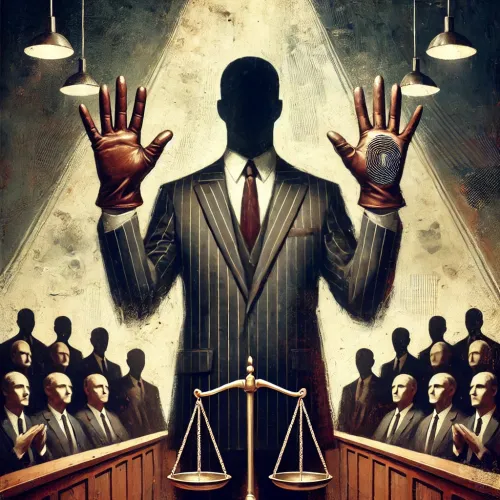Few trials in American history have captured public attention like the 1995 trial of Orenthal James (O.J.) Simpson. A former NFL superstar and beloved public figure, Simpson faced charges for the brutal murders of his ex-wife, Nicole Brown Simpson, and her friend, Ron Goldman. The trial was not just a legal proceeding; it became a cultural phenomenon, exposing racial and social divisions in the United States. At the heart of the case was a controversial verdict that many interpreted as an example of jury nullification, where jurors delivered a decision reflecting societal tensions rather than the legal evidence.
The prosecution presented a compelling case. Evidence included bloodstains matching Simpson’s DNA at the crime scene, a glove found near his home that matched one at the murder site, and a history of domestic violence against Nicole. Yet, the defense countered with a narrative that resonated deeply with a nation grappling with issues of race and police misconduct.
The defense team, known as the "Dream Team," included high-profile attorneys such as Johnnie Cochran and Robert Shapiro. They argued that Simpson was framed by a corrupt and racist Los Angeles Police Department (LAPD). Cochran famously compared detective Mark Fuhrman, who allegedly planted evidence, to Adolf Hitler during his closing arguments. The defense also highlighted the LAPD's history of racial bias, including the Rodney King beating just a few years prior, which had resulted in nationwide riots after the acquittal of the officers involved.
The jury, composed predominantly of African Americans, deliberated for less than four hours before returning a verdict of "Not Guilty." For many, this swift decision was a shock, given the mountain of forensic evidence against Simpson. Critics argued that the jury had ignored the facts of the case and allowed emotion and racial solidarity to dictate their decision. Others saw the verdict as a powerful act of defiance against a justice system they believed was inherently biased against Black defendants.
The Simpson trial exemplified the complex interplay between law and societal context. The jurors were not operating in a vacuum; they were acutely aware of the broader social dynamics at play. The trial unfolded against a backdrop of racial tension in Los Angeles, where distrust of law enforcement among Black communities was pervasive. Many jurors may have seen the trial as an opportunity to deliver a broader statement about systemic racism and the LAPD's abuses, even if it meant acquitting a defendant who might be guilty.
This aspect of the Simpson trial reflects a form of jury nullification. While traditionally associated with rejecting unjust laws, nullification can also occur when jurors resist the application of the law due to broader social or moral considerations. In this case, the verdict was less about Simpson’s guilt or innocence and more about delivering a symbolic rebuke to a system perceived as corrupt and racially biased.
The trial's aftermath was deeply polarizing. Polls revealed stark differences in public opinion along racial lines. Many Black Americans celebrated the verdict as a rare victory against systemic injustice, while many white Americans viewed it as a travesty of justice. The case became a cultural touchstone, sparking debates about race, celebrity, media influence, and the integrity of the legal system.
Critics of the jury’s decision argue that it undermined the rule of law and set a dangerous precedent for allowing social considerations to override evidence. However, defenders of the verdict contend that it brought attention to systemic flaws in the justice system, forcing a national reckoning with issues of race and policing.
The Simpson trial’s legacy is multifaceted. It highlighted the power of juries to reflect societal values, even when those values clash with legal evidence. It also underscored the challenges of ensuring impartiality in high-profile cases where public sentiment and media coverage exert immense influence. Moreover, the trial demonstrated the double-edged nature of jury nullification—capable of challenging injustice but also of fostering divisiveness when used in controversial contexts.
In the years since the trial, O.J. Simpson’s legal troubles have continued, including a 2008 conviction for armed robbery and kidnapping. While these later incidents have somewhat overshadowed the original trial, its significance remains undiminished. The case is still studied in law schools and discussed in popular culture as a landmark moment in American legal history.
Ultimately, the Simpson trial is a powerful reminder of the complexities of justice. It illustrates how juries can act as both mirrors and agents of societal change, reflecting the tensions and values of their time. Whether viewed as a miscarriage of justice or a necessary statement against systemic inequity, the trial’s verdict demonstrates the enduring impact of jury decisions on the legal system and society as a whole. In this case, the jury's role transcended the courtroom, leaving a legacy that continues to provoke reflection and debate.




